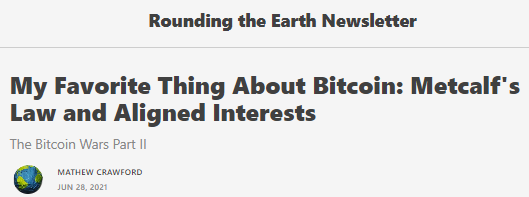Intermediate Technology Lesson: What are Smart Contracts?
The Bitcoin Wars Part 26
Find other Bitcoin Wars articles here. Find more discussion at the RTE Locals community.
Recently, I reached out to somebody doing good documentation of relationships during the pandemic. This person scanned my substack, and decided to talk down to me in a denigrating way due to my writings on Bitcoin. The emails I received were a strange jumble of confusion that made it clear that this person did not understand the basic definitions of the words that she was using. As a result, she could not sort out the possibility that there are symmetric and asymmetric uses of digital currency technology (the balance of which relates to whether or not powerful individuals can manage to harm vast populations, or whether or not a technology can be weaponized at all). She seems to just lump it all together into, "Digital money bad," and "means bad things for humanity.") I wonder if she knows what years most money became digital—or 90% of it—or 99% of it. Because we've been past these points for years.
We should be quite concerned about potentially harmful uses of technology. The best way to proceed is by building a level of competence with those technologies that seem most important to the world today. The purpose of this article is to take one step by explaining one aspect of digital currencies.
I sympathize with the fear associated with a lack of understanding of technology. In fact, that's one of the reasons I stepped away from finance to spend 15 or so years in education. The more people we educate to a high level, the more symmetric the power of technology. I believe that symmetric utility leads to relatively democratized power, which prevents the damage that authoritarian tyrants can achieve. Powerful people accrue their status largely as the result of asymmetric uses of technology. We can either run around in a panic about it, go full unabomber, or put in the effort to master technologies in order to accrue wealth and power ourselves (then keep the sword sheathed until hopefully rare judgment guides us).
The reason that I prefer Bitcoin to the current central banking system is that Bitcoin is specifically designed to remove features of currency/monetary weaponization and theft. As a result, I think that Bitcoin removes the centralized powers currently manifest in the global banking system. How Bitcoin manages all that is the topic of another article (or several, or a good book), and requires thinking through some basic game theory.
Now, let's talk about what smart contracts are…
A Proper Definition of a Smart Contract
Most of the definitions that you're going to find on the internet for smart contracts are flawed in a way that accidentally disguises the nature of a smart contract. Here is IBM's definition:
Smart contracts are simply programs stored on a blockchain that run when predetermined conditions are met. They typically are used to automate the execution of an agreement so that all participants can be immediately certain of the outcome, without any intermediary’s involvement or time loss. They can also automate a workflow, triggering the next action when conditions are met.
So, put simply, smart contracts are automated programs. We're going to put a pin in that simple definition. Now, let's talk about the other parts of the paragraph…
The point of a smart contract is that the procedure being carried out has a level of fidelity that is essentially outside of the control of the participants. There is no haggling, no worry about counterfeit goods or services, and no need to build up trust in slow steps between counterparties who are not highly familiar.
Further, the cost of the intermediary is relatively certain (the cost of computing, plus perhaps a network fee).
We might say that a smart contract sees usage because it is the solution to an optimization problem with respect to trust and costs. This helps us get closer to the most functional definition of a smart contract, but we'll have to go a little deeper—back through the history of technology—to best understand smart contracts.
So far, I think that IBM's definition is just fine, if lacking perspective, but there is one piece I'd like to quibble with. And it's an important quibble: the essential nature of the smart contract did not begin with blockchain.
A Brief History of Smart Contracts
A reading of the Wikipedia article on smart contracts makes an interesting point.
Vending machines are mentioned as the oldest piece of technology equivalent to smart contract implementation.[3]
You insert money (physical or digital) into a vending machine, and that vending machine returns to you some sort of item:
Food or beverage,
Plush toy,
Egg with mystery treat,
A gaming experience,
Medicine,
Marijuana or tobacco products,
Currency of another form.
It will take a little time to understand why vending machines are smart contract systems of a particular type. And for the moment, let's put out of our minds the fact that more people die each year from vending machines than from shark attacks. For the most part, we find vending machines to be generally useful. For most of us—perhaps all of us who never risked getting our arms stuck in one for a candy bar or shook one until it tipped over on us—they are…generally worth the risks. They would not exist were they not profitable, hence they are technology (by the most appropriate definition)—and relatively symmetric technology that we don't have to worry about. In no version of this universe will vending machines be blamed for the tipping of global power.
Going back much further in history, let us focus on the grain banks, which might be likened to the earliest known vending machines. Much of the symbolic representation of arithmetic was invented to keep track of both the grain and the monetary system that developed around the tokens (first clay, then later metal) that could be traded for grain at the bank (or serve as currency in broader marketplaces). For a time, such technological advances tipped balances of power between civilizations. Controversially, they might have also been responsible for increasing the number of serfs and slaves in an empire, though we might also weigh that against the health and quality of living improvements of those less powerful members of society. Those are certainly conversations worth having, but for the moment, I will move on…
We might also point out that weapons are smart contracts. A gun turns a bullet into a high-kinetic ballistic event. Insert additional analogies here. I bring this up because guns and other weapons are often referred to as genies that cannot be stuffed back in the bottle. Even if total regulation were possible, that would simply mean that the ruling organization had asymmetric control over their usage—that's authoritarian control, which comes with even worse sets of abuses and risks.
We might even liken Substack to an information vending machine, making Substack a smart contract system. Yes, really.
All of this practical and historical contracts allows for us to define smart contracts in a way that the average person can better comprehend:
A smart contract is an automated process that converts one form of energy into another.
This definition includes smart contracts within digital ledger systems as well as your refrigerator (which turns electricity and some components into contained cooling). It includes power generators and satellites.
We might even say that every simple machine is a form of a smart contract. However, we have now expanded the definition of a smart contract beyond the scope of exchanges of energy that involve two agents (in the economic sense of free and independent actors). And the primary problem that smart contracts on the blockchain solves is the issue of contract fidelity between two rational actors/agents with their own free will, involving digital currency.
Let us summarize:
A smart contract is an automated process that converts one form of energy into another. Smart contracts on the blockchain solve problems of contract fidelity between two agents.
That last part is the important part of understanding that (1) smart contracts are an extremely broad class of technology that is not inherently bad, and (2) we need to up our educational game in order to have the appropriate conversations about how to build a world in which smart contracts are not used for nefarious purposes (like digital enslavement or serfdom of the masses).
TechTarget.com has a list of 10 examples of smart contracts on the blockchain. What is best to understand is that these contracts function according to standard encryption technological practices. In other words—you control your information by controlling your private keys (passwords). Here are a couple of those examples. It doesn't take much thinking to realize that these applications remove the need for "trusted third parties" (which are human points of trust failure who might sell out your privacy, or outright steal your money/energy/time):
4. Eliminate the go-between in financial transactions
Blockchain technology has brought attention to decentralized finance. It is most associated with peer-to-peer (P2P) cryptocurrency transactions like bitcoin and ethereum. Digital currency using a smart contract could reduce the time and cost of settling these transactions. In addition, smart contracts show promise in automating manual banking processes traditionally performed by a financial institution, such as evaluating loan eligibility, processing claims and implementing regulatory compliance.
5. Enhance the healthcare communication pipeline
Clear communication is critical for both insurers and patients. Storing a patient's chart on the blockchain could potentially cut down on paperwork processing, improve regulatory compliance and supply straightforward information sharing between providers. For instance, a patient requires a specific medical procedure. A prior authorization request triggers a smart contract by digitally reviewing insurance coverage and releasing payment to the overseeing facility.
One tip I might give to the Kunlangeta to chew on is to focus on the economic term "agent". Agency implies independent will. And if your plans involve subverting the will of other people, you're reducing the number of nodes—and hence the overall value—of the network you're trying to gain control over.
Owning 100% of a devalued network does not make one wealthier than owning 0.000001% of a network that is a billion times as large. This is why the royals of yesteryear did not live as comfortable or fulfilling lives as the average healthy citizen of today.





Given the treatment faced by Daniel Micay (GrapheneOS founder), no doubt egged on by “somebody” who does not want phone privacy, it isn’t surprising at all that these kinds of things happen as you come back to BTC & blockchain concept in general.
Please continue your efforts in this arena. While I bang heads with you about medical issues on occasion, you are STELLAR in addressing these issues (and other ‘numbers’ topics). People need to grasp these concept if widespread adoption is ever going to happen. Trouble is Money.gov will provide an “easy” solution, and you won’t even have the risk of LOSING your $$. Of course THEY may shut it down, but no lost flash drives with millions in BTC going in the trash!
Actually it is like using Apple vs. GrapheneOS. People want easy & convenient, NOT reflashing their own phone! And “it’s so trendy!” CBDC will be sold to the masses as cool, trendy, progressive, and saving the planet 🦄🌈
"In other words—you control your information by controlling your private keys (passwords). Here are a couple of those examples. It doesn't take much thinking to realize that these applications remove the need for "trusted third parties" (which are human points of trust failure who might sell out your privacy, or outright steal your money."
So you're saying it's impossible to hack into such a system. Don't clever thieves manage to steal a bunch of candy bars from a vending machine without getting their arms stuck in the mechanism. Another thing, if we're devolving into an authoritarian technocracy the powers that "shouldn't" be would never permit competing currencies. And finally, what happens when the power goes out.